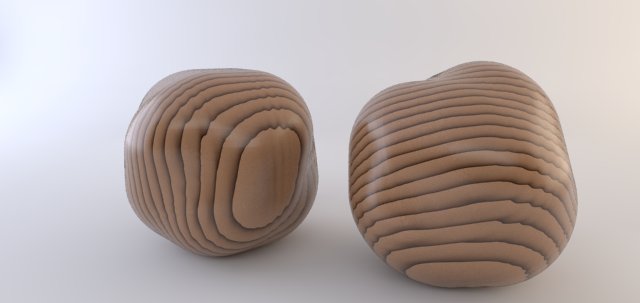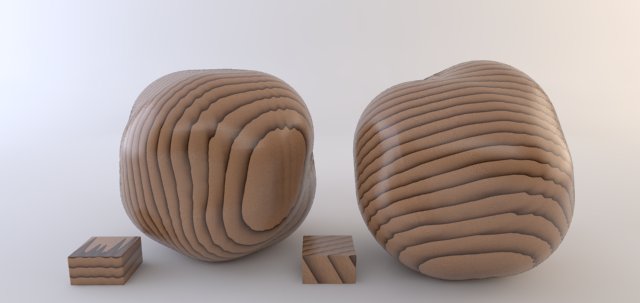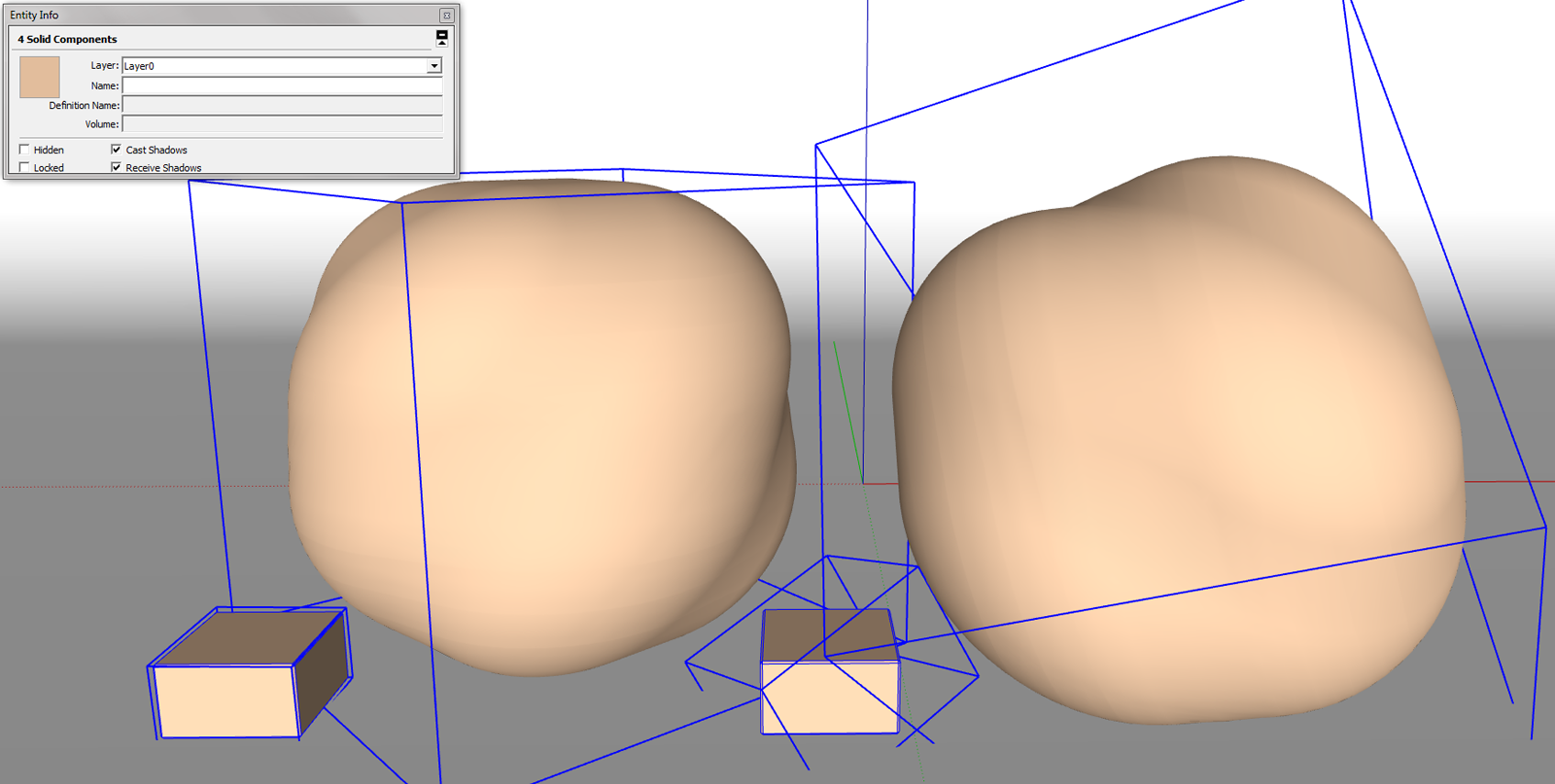A quest for better understanding of textures
-
@broomstick said:
@thomthom said:
Only at render time. SketchUp has no knowledge of how V-Ray materials are designed.
So how does this make them usable?? Maybe I'm just too used to using vray materials in 3d studio max!
Make use of the preview feature in VfSU's material editor (it's not great I know) or make small test scenes. I've done similar tests before to visualize these V-Ray textures and used several of them in my project.
-
I did some test with the procedural texture for wood. The variable 'center_v' seems to have the most influence on the texture size.
It is a 3d texture, I think that means that the object cuts through the texture somehow. It reminds me of the old days with POV-ray - which has extensive documentation on all of its functions, including its procedural wood texture. (although I'm not sure wether or not they are mathematically the same)

-
That's a nice sample. Thanks!

-
wow, thanks for this

another thing i discovered is that with 'use_3d_mapping' checked (ie. it's ON), the result is just like you showed us; however, if you uncheck it, you'll get a texture of the wood end. demonstrating on your material:

however, i couldn't get center_v get to change the scale on my textures. i would say that center_u and _v define the center position of the texture, so i don't think this would affect the size... more testing is needed though.

strange thing is that even when in the TexWood preview window something is happening, in the material preview and in the render not so many things change...
-
Oh yeah also this; the placement is dependent on the origin of the model or component. I'm not exactly sure how the difference between applying a material to a face or to a component is in play, but the component axes thing is clearly demonstrated in the example below:

In this image, the two little blocks on the floor are the same component - one of them made unique and the axes of that one have been put at an angle of 45 degrees in two directions.
As for the balls, they are the same component, one of them is rotated.
-
just for reference, how big are your... items? ('balls' would seem inappropriate ^^)
my sphere is 2,646m in diameter.
-
the big ones are 470mm in diameter, the little blocks are 100mm
-
may I publish here a little tutorial on how to use the Vray Blend Material?
It's useful to have bump maps without a diffuse texture (sort of)
-
sure, please, go ahead

-
@broomstick said:
may I publish here a little tutorial on how to use the Vray Blend Material?
It's useful to have bump maps without a diffuse texture (sort of)
Yes. But please post in a new thread, and tag it [Tutorial] so it's easier to find.
-
@thomthom said:
@broomstick said:
may I publish here a little tutorial on how to use the Vray Blend Material?
It's useful to have bump maps without a diffuse texture (sort of)
Yes. But please post in a new thread, and tag it [Tutorial] so it's easier to find.
Gotcha

-
@broomstick said:
may I publish here a little tutorial on how to use the Vray Blend Material?
It's useful to have bump maps without a diffuse texture (sort of)
yes you can!

-
@eidam655 said:
hello winGman,
create a material, open it in material editor:
[attachment=1:bo417hjm]<!-- ia1 -->texgrid_tut_1.png<!-- ia1 -->[/attachment:bo417hjm]
assign the TexGrid texture to the Diffuse channel (or some other channel, depending on your desired usage) and try to play around with the UV repeat values to adjust its size:
[attachment=2:bo417hjm]<!-- ia2 -->texgrid_tut_2.png<!-- ia2 -->[/attachment:bo417hjm]after this, my render looks like this:
[attachment=0:bo417hjm]<!-- ia0 -->texgrid_tut.png<!-- ia0 -->[/attachment:bo417hjm]and that should be it

is there anyway we can change multiplier by measuring tilesize. ? this would be useful while making bump maps for tiles divided in a grid. say if i want tilesize 300mm by 300mm how can i do it?
-
@eidam655 said:
-
rock/noise pattern. is not affected by UV repeat values.
-
smoke/noise pattern. is not affected by UV repeat values.
-
snow/noise pattern with alternating alpha. is not affected by UV repeat values.
-
speckle/noise pattern. is not affected by UV repeat values.
-
splat/noise pattern. is not affected by UV repeat values.
-
presumably stucco/noise pattern. is not affected by UV repeat values. sadly,
-
is not affected by UV repeat values. in fact, it's the same case as with Stucco. a
-
is not affected by UV repeat values. i
my 50 cents to help your quest.

recently i discovered that for the textures rock - stucco - smoke - snow - speckle - splat - water you should untick "use 3d mapping" to enable UV tiling control.
-
-
Has anyone ever come across any clear documentation for all of these effects? The fact that there are so many cool procedural maps available, but the tutorials for how to utilise them are not seems a waste.
I've spent a good few hours playing around with them before but managed to get no practical use out of them because, as you know, with all the variables you can change it would take weeks or months to learn anything through trial an error.
This is probably less of an issue for Max users who tend to have had some kind of professional training, but those who use Sketchup for visualisation are at the shallow end of the visualisation pool are largely self trained I imagine. (Along with using amazing resources such as Sketchucation, of course
 )
) -
well, at least i haven't, that's why i opened this thread

-
Do the original images to this thread still exist? I've been looking for this information on vray materials for a while, and this is the most promising result.. but it seems the image links are no longer valid? Or, can the information be found elsewhere?
-
hm, it seems my access to the old server got taken down (or my files have).
i'll try to find the images somewhere in my backups... however, all of these were for vray 1.49 and the question is how relevant they still are.
but as i said, i'll try to find them, just in case the were.
-
@eidam655 said:
hm, it seems my access to the old server got taken down (or my files have).
i'll try to find the images somewhere in my backups... however, all of these were for vray 1.49 and the question is how relevant they still are.
but as i said, i'll try to find them, just in case the were.
Hi eidam655, are there any chances that you have found images from the first message?
-
Hi, I haven't found the images.
But after the school's done in January I'll try and recreate the post again; the question is, how many people would be interested in the old 1.49 version and how many in the new VRay 2.0, since I imagine quite a lot of people have adopted the new release.
let me know,
eidam
Advertisement







